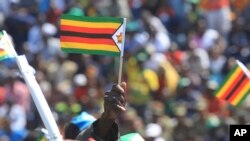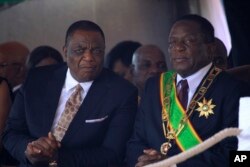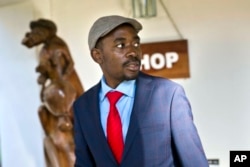Zimbabwe is at a tense standstill as the presidential inauguration has been delayed due to the opposition's legal challenge to the July 30 election results. This was the first election without Robert Mugabe on the ballot, and analysts are not entirely sure what to make of this moment in the country's history.
Zimbabweans went into last month's general elections, the first in 38 years without Robert Mugabe atop the ballot, with great hopes.
Even before results were announced, opposition supporters took to the streets of the capital, Harare. At first, they celebrated. Then, they protested the delay in results. Finally, they ran for their lives after security forces fired live rounds, killing six people.
Now, two weeks after the poll, the declared victor — incumbent Emmerson Mnangagwa, who took over in November after Mugabe's resignation — still has not been inaugurated.
He is held in limbo as the opposition Movement for Democratic Change alliance challenges his narrow, 50.8 percent win.
They say challenger Nelson Chamisa, who officially got 44 percent of the vote, won the poll.
Lawyers for the party filed their case on Friday, saying they believe the poll was not conducted in according to "standards of fairness, transparency and accountability."
International observers praised the poll for being peaceful but raised concerns over the environment around the vote and the campaign.
Under Mugabe, the outcome of every poll was predictable. Over his decades of rule, he was accused, often and credibly, of poll-rigging and intimidating voters.
But for the first time in ages, even analysts say they're not quite sure how this will end. Professor Annie Chikwanha, of the University of Johannesburg said it is a very "precarious" situation, "sort of like hanging over a cliff, not very dangerously, but somehow, dangerously. And that's because of the uncertainties surrounding what will happen once the Constitutional Court has given its verdict."
What analysts say needs to happen is unlikely: two men from different generations, different temperaments, and different ends of the political spectrum need to come together. Chamisa has outright dismissed suggestions of entering into a government with Mnangagwa, and said the two men have not spoken.
Chikwanha said they need to mend that bridge.
"Politically, it is important for whoever wins to take in, or bring the other one on board," he said. "They may not want to do it, but there has to be some form of appeasement that would appeal to the general electorate and to the voters, or to the public that supports the loser."
Analysts say they hope Zimbabwe can move forward, and that this election will be a blip in that journey.
Professor David Moore of the University of Johannesburg recalled that he had said "far in advance of the 2017 coup that this would be an election that wouldn't count."
"2023 would count," he continued, "because the younger generation, which cut their teeth in the early 2000s against the regime, are now gaining maturity, having experience. And if they can maintain a hold over the MDC, and perhaps other opposition parties that might emerge, we will see a much different election."
But right now, as Zimbabwe waits, that may be cold comfort for this very divided nation.






